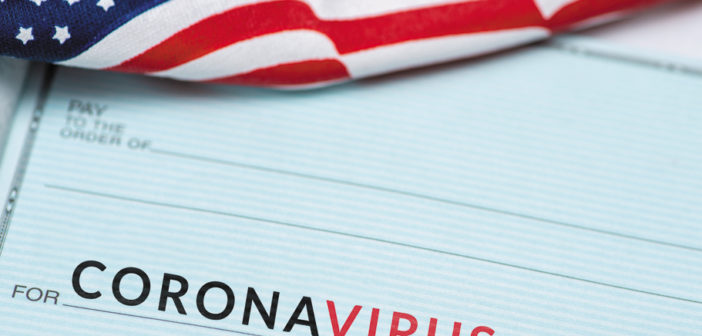by SEAN GROSSNICKLE
Since early March, the unprecedented impacts of the COVID-19 pandemic have mobilized Congress and the White House to provide emergency relief for the nation’s economy while also adopting measures to curtail the spread of the virus. The pandemic has created common ground for Democratic and Republican lawmakers where swift, bipartisan action has resulted in a series of COVID-19 relief packages.
PHASE 1
U.S. lawmakers first responded to the impacts of COVID-19 on March 6 with “Phase 1” of pandemic relief. H.R. 6074 – the Coronavirus Preparedness and Response Supplemental Appropriations Act – providing $8 billion of funding to the nation’s public health response to treat and lessen the spread and negative effects of the virus. This “Phase 1” package contained measures to expand testing capabilities, vaccine research, and stockpiles of medical supplies. Although a portion of this fund was designated for an international aid, this phase primarily focused on funding the Centers for Disease Control and the Department of Health and Human Services as the agencies rushed to coordinate state and local efforts to respond to the virus.
PHASE 2
Days after passing “Phase 1,” lawmakers quickly turned their attention to providing relief to businesses and individuals affected by the pandemic. On March 14, H.R. 6201 – the Families First Coronavirus Response Act – became law, adding $3.5 billion in emergency supplemental appropriations. This “Phase 2” measure contained paid leave requirements and resources for small businesses as well as funding for states to process and pay unemployment claims. It also allocated funds to food programs to ensure that important services and meals are available to families and individuals in need.
PHASE 3
Next, Congress and the White House enacted “Phase 3,” passing the single largest stimulus package in U.S. history. H.R. 748 – the Coronavirus Aid, Relief, and Economic Security (CARES) Act – is a $2.2-trillion bill designed to provide emergency assistance to sectors of the American economy and individuals severely impacted by the pandemic. Signed into law on March 27, the CARES Act includes numerous measures to stabilize the economy, aid small businesses, financially assist individuals, and support national health care.
For hoteliers and other small business owners, the nearly $350 billion allocated to the Paycheck Protection Program (PPP) is the most critical component of the “Phase 3” stimulus. The PPP provides loans to small businesses to cover payroll and other operating costs. As millions of eligible small businesses sought loans under the PPP, the initial funding ran out within weeks, pressing Congress to pass an interim relief bill.
PHASE 3.5
Having felt the urgency to re-fund programs like the PPP, Congress moved to pass an interim COVID-19 relief bill as “Phase 3.5.” This phase was enacted on April 24 under H.R. 266 – the PPP and Health Care Enhancement Act – following a period of debate between Democratic and Republican lawmakers. This bill allocated an additional $321 billion to the PPP while funding other disaster loan programs, hospitals, and COVID-19 research.
In a press release covering the passage of “Phase 3.5,” AAHOA President & CEO Cecil P. Staton noted his gratitude for Congress’s swift action while advocating for vital measures to be considered in subsequent phases of relief legislation.
“The stimulus also does not address the reality that this crisis will not be over in a matter of weeks. That is why we continue to call on Congress to extend PPP through the end of 2020,” Staton said. He noted that “hotels are a signal industry,” meaning they are the first to feel the impact of the COVID-19 pandemic and they will be the last to recover.
THE NEXT PHASE
As Congress moves to draft its next phase of COVID-19 relief, Staton calls for targeted support for the hotel industry. “We also encourage policymakers to give more consideration to a business’s debt obligations, such as mortgages, as they formulate relief loans and determine how they can be spent,” he said.




